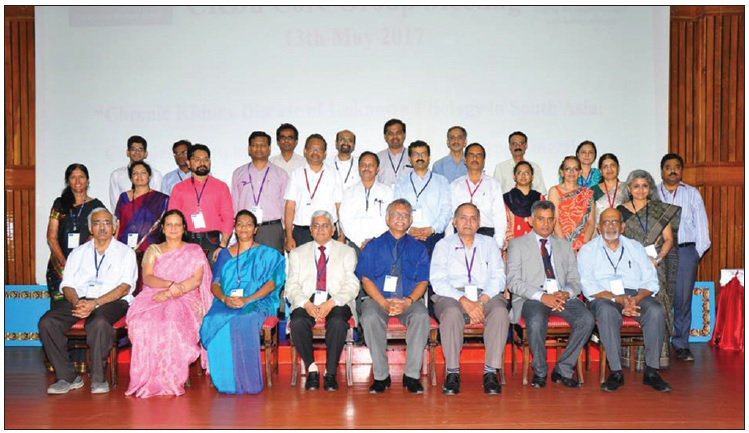Translate this page into:
Preface
-
Received: ,
Accepted: ,
This is an open access journal, and articles are distributed under the terms of the Creative Commons Attribution-NonCommercial-ShareAlike 4.0 License, which allows others to remix, tweak, and build upon the work non-commercially, as long as appropriate credit is given and the new creations are licensed under the identical terms.
This article was originally published by Wolters Kluwer - Medknow and was migrated to Scientific Scholar after the change of Publisher.
CKDu is an emerging challenge in select districts in India and Sri Lanka. CKDu mostly affects farmers in the rural areas who have poor access to health care. A core group meeting was held at The Madras Medical Mission Hospital supported by TANKER Foundation Chennai on May 13, 2017 to address “Chronic Kidney Disease of Unknown Etiology in South Asia: Case definition and research priorities [Figure 1]”. The purpose of the meeting was to bring together the experts from nephrology and public health to review the existing knowledge and discuss the research priorities. The meeting participants included nephrologists, pathologists, public health researchers, and other stakeholders, including representative from ICMR and WHO.

- CKDu Core group Chennai, May 2017
The discussion focused on coming to a consensus about the definition of CKDu and the priority areas for research to take forward the cause of CKDu. CKDu has been found to be prevalent in pockets of Andhra Pradesh, Orissa, Goa, Karnataka, and Sri Lanka especially in rural areas where the economically backward sections of society have been affected. The group explored the ways to develop a strong community to advocate for the research and interventions for CKDu in affected areas. The proceedings of the discussions of the core group are being published in the supplement of the Indian Journal of Nephrology. Dr. T Ravi Raju and Dr Gangadhar Taduri brought to notice of the international community, the CKDu prevalence in Srikakulam district and named it as Uddanam Nephropathy.






